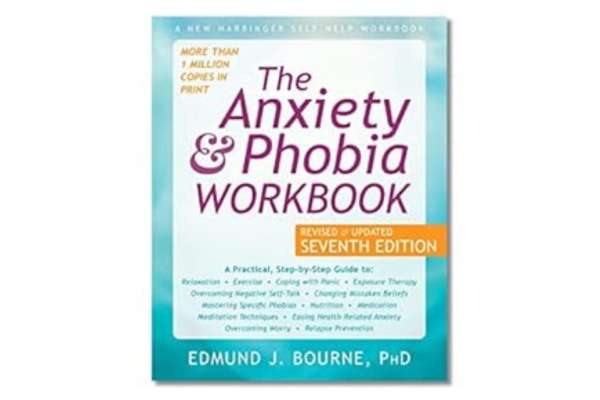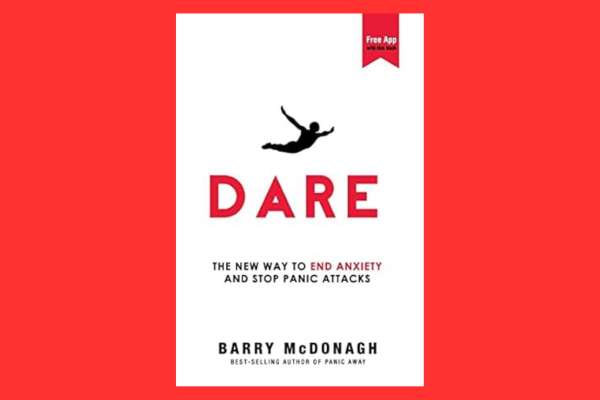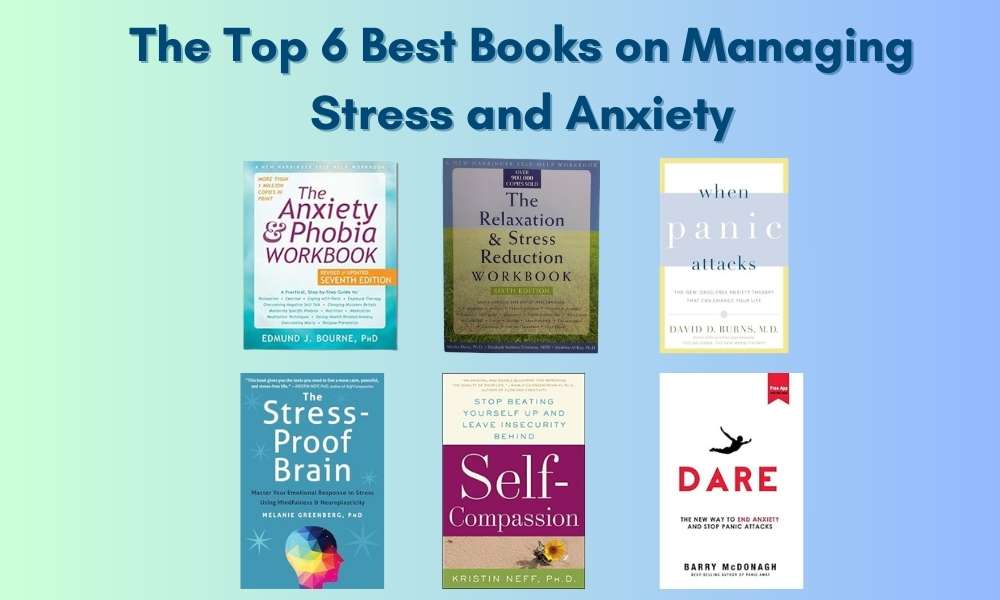Stress and anxiety have become prevalent challenges in today’s fast-paced world, affecting individuals across all walks of life. Whether triggered by work pressures, personal relationships, or unforeseen circumstances, managing these feelings is crucial for maintaining mental and physical well-being. Fortunately, books can be powerful tools for understanding and overcoming stress and anxiety. The Top 6 Best Books on Managing Stress and Anxiety offer practical advice, evidence-based strategies, and inspiring insights to help readers regain control over their emotions. These books cover a diverse range of approaches, from cognitive-behavioral techniques and neuroscience-backed methods to self-compassion and relaxation practices, ensuring that there is something for everyone seeking relief and resilience in the face of life’s challenges.
1. The Anxiety and Phobia Workbook by Edmund J. Bourne

This comprehensive guide is a cornerstone for the ones looking for practical solutions to control anxiety and phobias. The Anxiety and Phobia Workbook offers a holistic approach. Combining cognitive-behavioral strategies, mindfulness, relaxation sports, and lifestyle guidelines to address numerous styles of anxiety issues. The book is full of actionable physical games and worksheets, making it a palms-on useful resource for readers to tune their progress and actively work towards reducing anxiety. Its scientifically grounded techniques, consisting of exposure remedy and desensitization, are based on decades of research inside the field of psychology. This ebook is mainly nicely-suitable for folks that decide upon structured, step-through-step guidance. As well as for therapists looking for a supplemental device for his or her clients. Whether you’re new to managing tension or trying to deepen your knowledge. This workbook is a valuable useful resource for personal boom and recovery.
2. Dare: The New Way to End Anxiety and Stop Panic Attacks by Barry McDonagh

Barry McDonagh’s Dare introduces a clean and transformative technique to managing tension and panic attacks. At its center is the “DARE” response method, which encourages readers to defy their irritating mind, take delivery of pain, run toward their fears, and engage with their challenges instead of keeping away from them. This method empowers individuals to break loose from the cycle of worry and avoidance. Providing an effective opportunity to traditional coping strategies. What sets Dare apart is its engaging, conversational tone and practical techniques which can be clean to integrate into each day’s lifestyle. The book additionally includes guided audios and extra online resources, making it a dynamic and interactive experience. Dare stands proud among other tension resources for its proactive, empowering philosophy. Making it a perfect choice for people who are prepared to manage their anxiety in a bold and high quality way.
3. The Stress-Proof Brain by Melanie Greenberg
In The Stress-Proof Brain, Melanie Greenberg delves into the neuroscience behind stress and anxiety. Supplying readers with a deeper understanding of ways their mind responds to difficult situations. The e-book explains how stress impacts brain function, specifically in areas related to selection-making, emotions, and memory, whilst presenting scientifically supported techniques to rewire those responses. Greenberg introduces practical tools along with mindfulness, emotional law strategies, and cognitive reframing exercises to help readers build resilience and regain manipulation over their strain responses. These strategies are designed to convert the mind’s response to pressure right into an extra balanced and adaptive reaction. The Stress-Proof Brain is good for people seeking a proof-based technique to cope with stress and tension, especially people who need to blend clinical insights with actionable steps in their personal and professional lives.
4. Self-Compassion: The Proven Power of Being Kind to Yourself by Kristin Neff
Kristin Neff’s Self-Compassion highlights the pivotal function of self-kindness in assuaging pressure and anxiety. The ebook affords compelling studies displaying how treating oneself with the identical care and knowledge supplied to a chum can lessen feelings of self-criticism and emotional distress. Neff seamlessly integrates private anecdotes, mental studies, and realistic physical games to manual readers toward cultivating self-compassion. By focusing on self-popularity and mindfulness, the e book allows individuals destroy unfastened from the harmful cycle of perfectionism and self-doubt. The transformative effect of self-compassion on intellectual fitness is evident as readers learn to method challenges with more equanimity and internal peace. This book is specifically suited for all of us suffering with feelings of inadequacy, strain, or burnout and in search of a compassionate, studies-sponsored route to recuperation and increase.
5. When Panic Attacks by David D. Burns
In When Panic Attacks, David D. Burns introduces readers to cognitive-behavioral techniques (CBT) for managing anxiety and panic disorders. The book offers a fresh perspective by addressing common misconceptions about anxiety. Such as the belief that panic is uncontrollable or permanent. Burns uses his expertise to present practical strategies, such as identifying and challenging distorted thinking patterns. Practicing exposure therapy, and replacing fear-driven thoughts with rational ones. The reader-friendly format includes case studies, questionnaires, and easy-to-follow exercises, making it accessible even to those new to psychological concepts. What sets this book apart is its optimistic tone and the emphasis on self-help, providing readers with tools to take charge of their mental health without feeling overwhelmed. When Panic Attacks is an excellent choice for individuals looking for actionable and scientifically proven methods to reduce anxiety and reclaim their peace of mind.
6. The Relaxation and Stress Reduction Workbook by Martha Davis, Elizabeth Robbins Eshelman, and Matthew McKay
A cornerstone in stress management literature, The Relaxation and Stress Reduction Workbook is a rich compilation of techniques to help readers combat stress and anxiety effectively. The book features a variety of methods, including progressive muscle relaxation, deep breathing, mindfulness, and visualization, catering to a broad range of preferences and needs. Its step-by-step exercises and worksheets enable readers to personalize their approach, track progress, and build long-lasting habits. With its blend of theory and practice, this workbook empowers individuals to find the strategies that resonate most with them. A classic in its field, this book remains a go-to resource for anyone—from beginners to experienced practitioners—looking to enhance their relaxation skills and improve their emotional well-being.
Read more: 5 Simple Stress Hacks You Can Do in Less Than 2 Minutes
Conclusion
In a world where stress and anxiety are constant companions for many. Finding effective tools to manage these challenges is essential. The Top 6 Best Books on Managing Stress and Anxiety provide invaluable guidance, offering diverse approaches that cater to different needs and preferences. From neuroscience-backed insights to practical exercises and self-compassion techniques. These books empower readers to take control of their mental health and build resilience. By exploring these resources, individuals can find strategies that resonate with them, helping to create a calmer, more balanced life. Whether you are just beginning your journey to stress management or looking to deepen your understanding. These books are a great starting point for lasting transformation.
We might recomend helpful products and if you buy through our links, we may earn a commssion.






